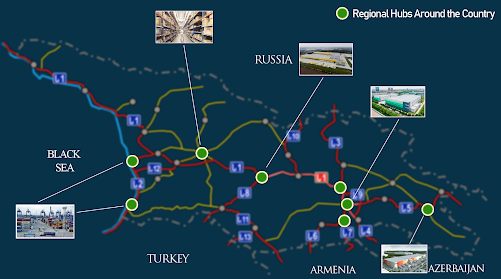Caspian-black Sea corridor
In our series, it has been noted several times, that Georgia is the gateway through which its adjacent countries can connect each other and manage to conduct regional economic activities. Previously we have talked about the south-north route, which we conventionally named the vertical corridor. As for today, we would like to introduce you to another crucial and more global route that is the Caspian-black Sea corridor. Let us see what importance it bears for the region and what an existential role it plays for the Central Asian and Caspian basin countries. Today we will discuss only the automotive route, i.e., a central motorway that crosses Georgia and ის the main driver of the region’s trade and logistics.
For
those landlocked countries of this part of the world, that do not have access to
the coastline, the Caspian-black
Sea corridor is the only shortest way to get to the coastline and
reach ports, therefore execute export-import on a global level. More than half of
the Caspian-Black Sea corridor is made by Georgia’s central Motorway. In comparison
to its south-eastern neighbors, Georgia stands in an advantageous position by controlling
over 130km of coastline with two main ports on it: Batumi and Poti ports.
Freights
coming from the eastern region reach these ports using the Georgian highway, which
makes part of the European international line E-60. Developing this route has been in its active
phase for the last 10 years. The infrastructure, turnover capacity, security have
been gradually improved and enhanced.
It’s worth mentioning that currently, we are witnessing a steady
annual growth of Transcaucasia cargo turnover through the Caspian and Back Sea corridor.
To emphasize the international importance of the road, we can at least highlight
ties between Azerbaijan and Turkey. Two strategic partners are trading between each
other mainly by land and so far, the only way to do so is transiting Georgia. Often,
Azerbaijan benefits from the business favorable customs conditions of Georgia and
re-exports goods deriving from turkey, instead of transport them directly.
In
a broader context, the central Georgian motorway could be much more impressive and
carry a global character. According to the vision of many international scholars,
considering the geographical position, our country is one of the most competitive
ones in terms of logistics today. Caspian – Black Sea corridor unifies in itself
several global vectors: These are: Azerbaijan-Turkey-Euro
Union vector; Asia-Russia-Euro
Union Vector and Asia-Iran-Turkey-Euro
Union Vector. this means that goods transported by lands and deriving
from or destined to the above-mentioned regions will transit Georgia by all means.
After all, to put aside discussions about international meaning,
the central highway is vital for Georgia’s native transportation net and economic
logistics activity, since exactly it links the main cities and economic urban centers
of our country.
And hence, today's blog depicted the global image of Georgia’s central
highway and now you are aware of the importance of the route crossing Georgia horizontally.
For the next time, we would like to introduce you to the figures and dates related
to the Caspian-black Sea corridor, share visions about its best possible future,
risks, and alternative routes.
Let us brainstorm together about the logistics and transport potential
of our Country.
Stay tuned!




Comments
Post a Comment